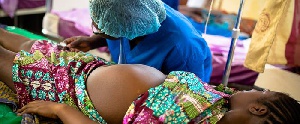A study has revealed that access to critical maternal health care service in the three regions of Northern Ghana; Northern, Upper East and Upper West regions is impeded with clinicians refusing to provide some legally prescribed services due to their moral or religious beliefs.
The research known as the Conscientious Objection to Legal Abortion Care was undertaken by reproductive health advocacy network, Global Doctors for Choice-Ghana (GDC, Ghana).
At a recent stakeholder conference in Accra, a leading member of the network, Dr. Chris Opoku Fofie told participants their survey found over 50% of the respondents (midwives, Physicians and Physician Assistants) who have received training and qualified to provide legal abortion care services currently object to providing such services. A total of 42% of service providers who took part in the study identified themselves as objectors of legal abortion care services on accounts of moral and religious beliefs.
Unsafe abortion ranks high among the causes of maternal mortality and morbidity. Dr. Fofie disclosed that current data shows about 15 % of maternal mortality in Ghana are as a result of unsafe abortion. The Upper East, Upper West and Northern regions of Ghana have some of the lowest indicators in various health care provider patient ratios. This situation according to GDC, presumes that access to reproductive health including safe abortion services is already limited and Conscious Objection to abortion care will further on aggravate the situation thereby increasing the use of unsafe abortion methods.
Whilst health service providers have the right to Conscious Objection of care, they also owe duty of care to their clients including the responsibility to refer the client to a service provider where safe services can be provided promptly. It is disturbing therefore to learn that some providers of such important maternal health service choose not to render the service despite receiving the training and possessing the skills.
The Ghana abortion law permits abortion by a qualified physician in the right environment under a wide range of circumstances including pregnancies occurring as a result of rape, defilement, incest, as well as the basis of a troubling health concern for the mother and or the fetus. However, moral and religious beliefs against abortion among service providers are a major barrier to safe legal abortion care services for women and girls.
Globally very few studies have been done on the prevalence of conscience based refusal of legal abortion care hence, the significance of the study by GDC, Ghana.
According to a member of the research team, Philip Kwesi Ayivor, the study targeted service providers in public, private and faith based health facilities in the three regions.
In all, 213 service providers who consented to participate in the study were interviewed. Out of this number, 47 participants were from the Upper East, 51 from Upper West and Northern region 115.
Mr. Ayivor noted that although the findings of the study are disturbing, it was gratifying to know that most of the survey participants expressed support for a national policy guideline to regulate the application of Conscientious Objection. Also, majority of the respondents demonstrated high level of knowledge of the provisions in the abortion law in Ghana.
He disclosed that the recent stakeholder’s conference organized by GDC, Ghana in Accra was carried out in partnership with fellow reproductive health advocacy organization, Ipas-Ghana, and the Policy Planning Monitoring and Evaluation Division (PPME-D) of the Ghana Health Service. Mr. Ayivor said similar, briefings will be held with other key stakeholders in Ghana and beyond.
The World Health Organization (WHO), reports that unsafe abortion accounts for 13% of global maternal mortality with 95% of the cases occurring in developing countries.
Health News of Monday, 17 April 2017
Source: Mathias Aboba













